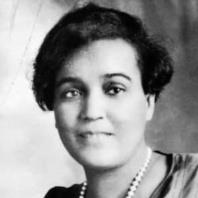|
Saturday, April 13, 2019
 Jessie Redmon Fauset was a New Jersey native and an innovator who advocated for new models for black racial characters in literature. As a female black editor, writer and educator in the first third of the 20th century, her literary talents impacted the evolving 1920's Harlem Renaissance to elevate and expand public perceptions of the American Black experience to images beyond that of a life of servitude. Decades ahead of other authors, she was a literary neoteric whose themes frequently focused on giving a voice to black working professionals, which was generally a new concept to the broad American public at that time. Her writings not only portrayed nuances of difficult black middle class daily struggles, but the reality of a wider spectrum of black life styles in the 1920's. Her authorship gave hope and promise to blacks who had not yet made it to the middle class and addressed issues of race and feminism. Read more . . .
Thursday, April 4, 2019
 April is Black Women's History Month. New Jersey was home to innumerable black women who dedicated their lives toward the betterment of life for others and changed the course of history. One such Black heroine is Madeline A. Williams. Her rise from humble beginnings in the South to becoming the first Black woman elected to the New Jersey Legislature is remarkable and inspiring. Read more . . .
Tuesday, April 2, 2019
 New Jersey employees may file whistleblower claims under the New Jersey Conscientious Employees Protection Act (CEPA) and discrimination claims the New Jersey Law Against Discrimination (LAD) simultaneously within the same lawsuit. However, a possible exception to recovery under CEPA is that one cannot recover damages under both the anti-retaliatory provision the LAD and CEPA when it is the exact same complained of facts that give rise to the retaliation claim because it would be a dual recovery for essentially the same retaliation claim. New Jersey’s whistleblower statute, CEPA, is one of the strongest whistleblower statutes in the Country. It prohibits employers from taking any retaliatory action against an employee in part because the employee discloses, or threatens to disclose to a supervisor or to a public body an activity, policy or practice of the employer, or another employer, with whom there is a business relationship, that the employee reasonably believes, is in violation of a law, or a rule or regulation, which includes employer violations of NJ statutes such as LAD. The Lad Also Has an Anti-Retaliation Provision That Prohibits an Employer from Retaliating Against an Employee Who Reports, i. Read more . . .
Friday, March 8, 2019
 This article concludes the discussion of wide-ranging influence of a remarkable unsung hero, Larry DeCosta. The exploration of the life of this prodigious champion for those who could not speak up for themselves appears in Part II of this trilogy published February 26, 2019. Champion of Equity and Fairness Larry DeCosta, as Executive Director of Camden Regional Services, believed in equity and fairness. As an attorney he frequently would argue “equitable” principles as well as “legal” principles” to obtain relief for his clients, whether they be minimum wage hotel housekeepers or indigents. This was demonstrated in the landmark NJ Supreme Court case, Community Realty Management v. Read more . . .
Tuesday, February 26, 2019
 Unsung hero Larry DeCosta was the quintessential legal champion of the poor without seeking publicity for his remarkable achievements. His soft-spoken and humble manner belied his toughness; he was strong, silent, and self-contained. His deep humility and southern gentility would frequently catch his legal adversaries off guard when they came up against Mr. DeCosta in a hotly contested matter. Without missing a beat or changing his tone, he would intellectually eviscerate the legal arguments of his unsuspecting adversary attorneys. Read more . . .
Friday, February 22, 2019
 Larry D. DeCosta, a black attorney from the South, was born on October 24, 1950 in Hampton, South Carolina to Thomas and Sue DeCosta. His soft-spoken and humble ways continued to comprise his professional demeanor as an attorney both in and out of court. He spoke fondly of his time growing up in South Carolina and would say that persons living in the Northern States had much to learn from the gentility of Southerners. Larry D. Read more . . .
Thursday, January 3, 2019
While strides have been made for LGBTQ persons (lesbians and gays particularly with the passage of the 2015 Marriage Equality Act) a double standard exists in some workplaces that results in a less than friendly workplace for LGBTQ workers. This double standard results in a work environment where sexual orientation for LGBTQ employees is still sexualized as documented in a study earlier this year released by the Human rights Campaign. Sexualizing Gay Employees and the Double Standard While non-LGBTQ persons may regularly make light conversation or comments regarding their dating situation, they may not accept LGBTQ workers doing the same because they fear hearing about an LGBTQ person’s sex life. The same is true for LGBTQ workers who are married or in other long-term committed same-sex relationships. Sexualizing LGBTQ persons also occurs when a co-worker or supervisor think they have a license to make sexually inappropriate jokes or comments because they wrongly believe that these comments are sanctioned because of the out-of-closet employee’s gender identity or sexual orientation. Read more . . .
Saturday, December 29, 2018
 It is illegal in New Jersey for an employer to discriminate against an employee because of that person=s relationship to or association with a member of a protected class, including race, under the New Jersey Law Against Discrimination. This is called, "Associational Discrimination." While the New Jersey Law Against Discrimination does not expressly identify associational discrimination as a distinct claim, numerous state and federal courts have upheld associational discrimination claims to be construed in accordance with the principals set forth in discrimination statutes, whose purpose is to eradicate discrimination. In a case against Karistos Corporation, a Caucasian female food server claimed she experienced many instances of racial harassment during the seven months she worked as a waitress at the diner where she was employed. Several of her coworkers made racially derogatory comments, including frequent use of the N-word, about her romantic relationship with an African American man, her fiancé, who was the father of her children. Read more . . .
Thursday, December 20, 2018
 Disabilities under the New Jersey Law Against Discrimination (NJLAD) may be visible or hidden, physical or non-physical. Disabled persons’ Companion dogs are not necessarily service dogs under the statute. Disabilities such as a heart condition or breast cancer may not be apparent to a supervisor or onlooker. An employee who has a disability which requires an accommodation should notify the employer in writing about the disability and the accommodation required. This is particularly true when it is a hidden disability or when it is not readily discernible unless it is brought to one’s attention. Read more . . .
Thursday, December 13, 2018
 Sometimes an employee believes another employee who is racist is “gunning to get them fired” even though the racist employee himself does not have the power to hire or fire employees.When a supervisor or manager who is not racist terminates a person, the terminated employee may wonder if he could ever have valid race discrimination claim. The terminated employee may have a valid Read more . . .
Wednesday, September 19, 2018
 Many employees 80 years and older want to keep working. This is due to an economic necessity as well as a life-style choice. Employers need to recognize the changing demographics of this country and allow their employees age 85 and older to remain employed. Persons frequently think of the generic class of seniors as those age 65 and older. Today, the most rapidly growing segment of the generic "senior" age group are persons in the more upper end of this senior age group, i. Read more . . .
|

|
|
|